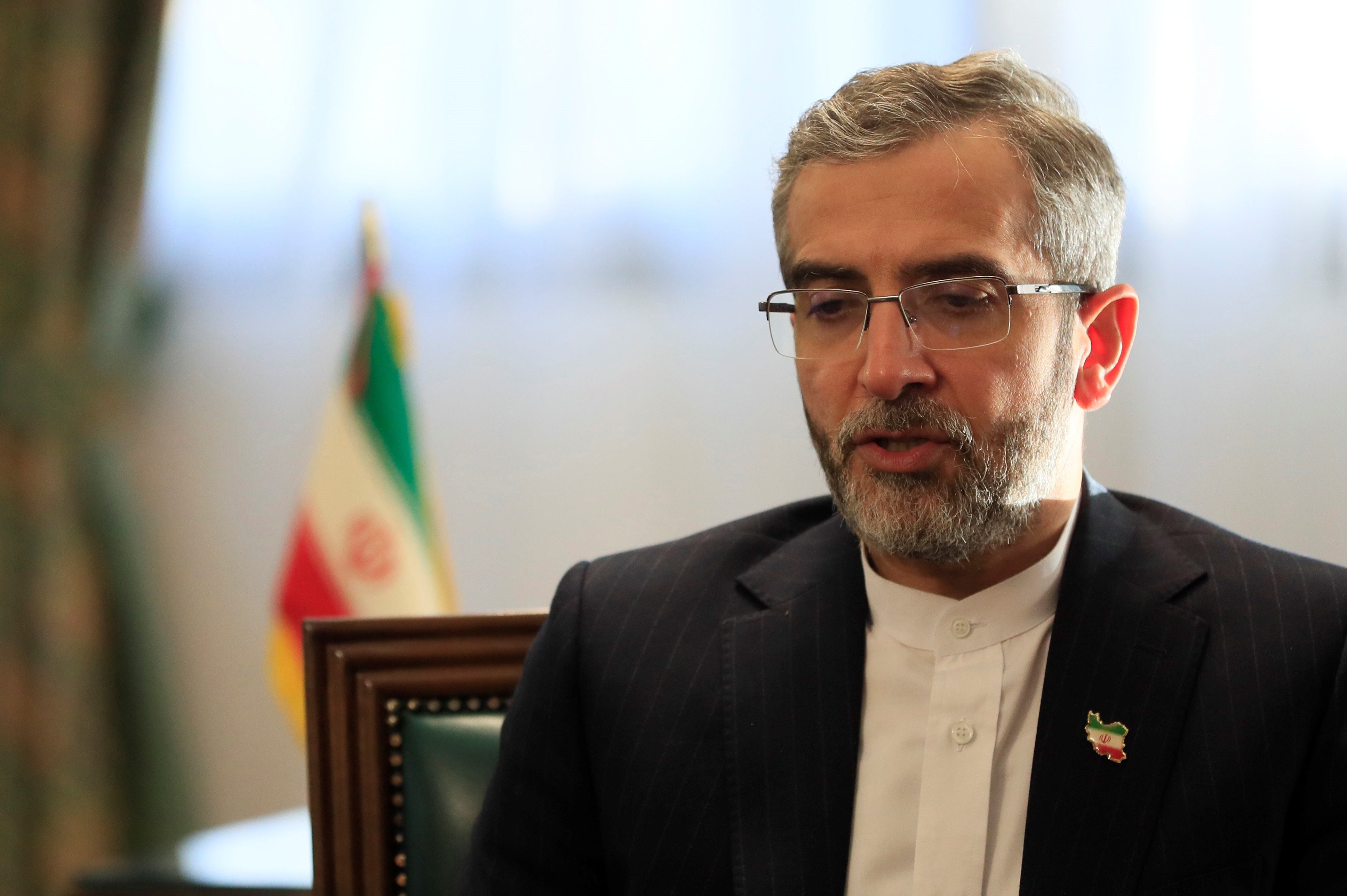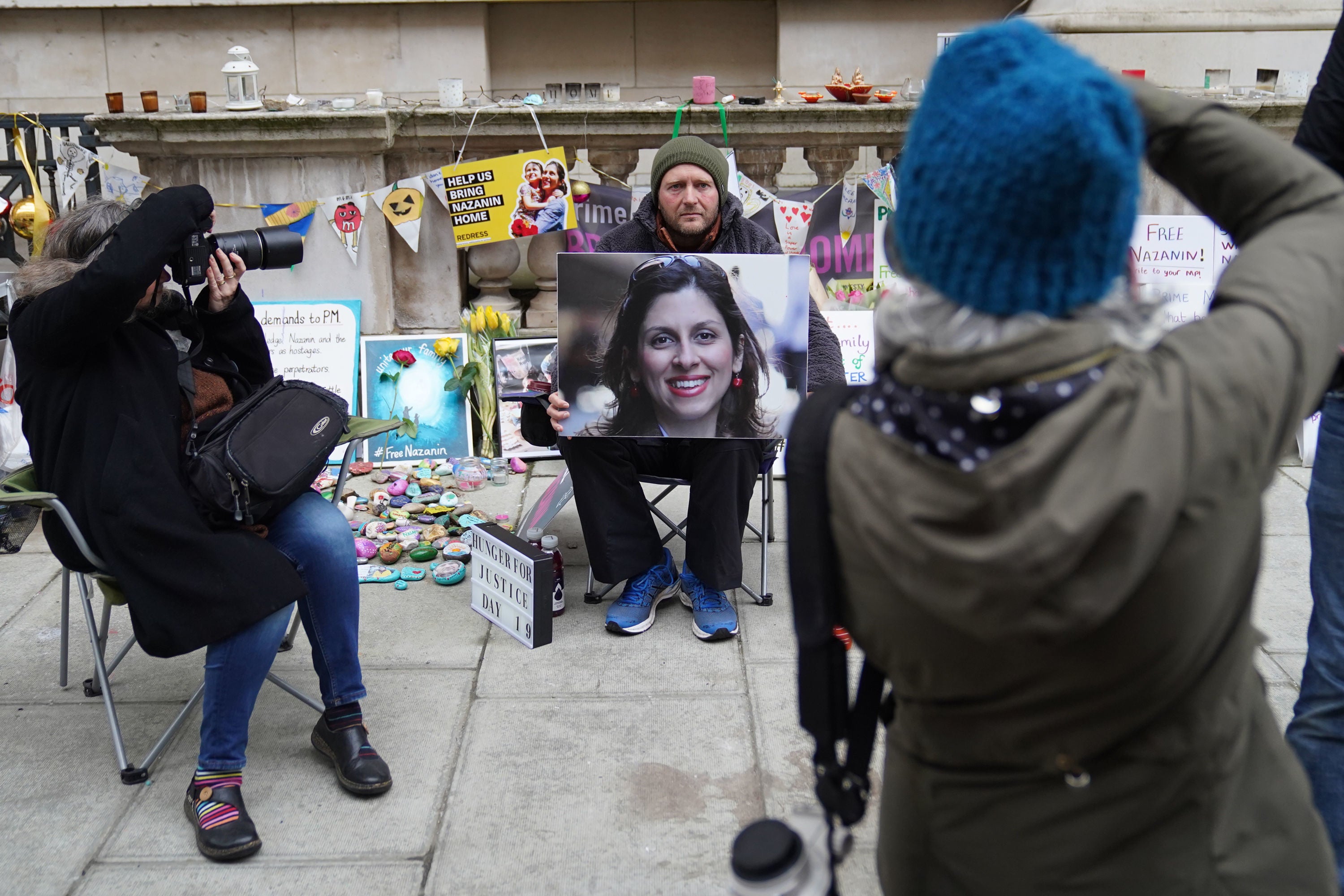Scrap all sanctions or nuclear talks will fail, Iran’s chief negotiator warns Washington
Ali Bagheri Kani also called on guarantees from Washington not to leave any future agreement

Your support helps us to tell the story
From reproductive rights to climate change to Big Tech, The Independent is on the ground when the story is developing. Whether it's investigating the financials of Elon Musk's pro-Trump PAC or producing our latest documentary, 'The A Word', which shines a light on the American women fighting for reproductive rights, we know how important it is to parse out the facts from the messaging.
At such a critical moment in US history, we need reporters on the ground. Your donation allows us to keep sending journalists to speak to both sides of the story.
The Independent is trusted by Americans across the entire political spectrum. And unlike many other quality news outlets, we choose not to lock Americans out of our reporting and analysis with paywalls. We believe quality journalism should be available to everyone, paid for by those who can afford it.
Your support makes all the difference.The first talks due to be held by Iran’s new government with international powers over the country’s nuclear programme will fail unless the US agrees to a key set of conditions, Tehran’s chief negotiator has warned.
The main objective of the negotiations in Vienna are that the Biden administration rejoins the landmark deal which former US president Donald Trump had unilaterally abandoned while imposing punitive sanctions on Iran.
But Ali Bagheri Kani stressed that any progress on that front must be preceded by the scrapping of all American sanctions, and a guarantee that a future administration in Washington will not once again renege on the agreement as Mr Trump had done.
Speaking to The Independent with the talks on the Joint Comprehensive Plan of Action (JCPOA) due to resume in Vienna on Monday, Mr Bagheri Kani, also complained that the Biden administration was repeating some of the mistakes of its predecessor and continuing with the “failed policy” of “maximum pressure” on Tehran, which has caused “ political bewilderment”.
The warning from Mr Bagheri Kani, who is also a deputy foreign minister, came at a time of rising uncertainty and alarm over Iran’s nuclear programme. The head of the International Atomic Energy Agency (IAEA) reported on Wednesday that talks held in Tehran had failed in getting suspended access to the nuclear sites for UN Inspectors.
Rafael Grossi, the director general of the IAEA, said the lack of access was posing severe problems for verifying what was taking place and may endanger the survival of the JCPOA.
He added that the agency was “close to the point when I will not be able to guarantee continuity of knowledge”. It was imperative, he wanted to stress, that “we must reach an agreement: we must do it”.
The meeting in Vienna follows the election of the conservative Ebrahim Raisi last summer in the Iranian Presidential election, which was followed by a pause in the talks which had been going on between Tehran and the other signatory states – Britain, France, Germany, Russia and China – which have stuck with the agreement signed after long and exhaustive efforts in 2015.
There is widespread recognition among other signatory states that the JCPOA will not properly function unless the US rejoins the deal. An American team will be at the Austrian capital, but will not meet the Iranians, with messages being passed through the other delegations.
But, Mr Bagheri Kani told The Independent: “The removal of all JCPOA related sanctions such as the sanctions imposed within the framework of ‘maximum pressure’ campaign is the necessary condition for success of the negotiations”.
“Demanding guarantees from the other party not to exit the deal, not to impose and enforce new sanctions, and not to reinstate and reapply the previous sanctions is aimed at neutralising the possibility that political chaos in the United States could have an impact on its international behaviour.”
Senior diplomats say the Americans are prepared to drop some of the sanctions.
The Biden administration, it is believed, would consider stating that it would not leave the JCPOA if it rejoined. But it is incapable, under the constitution, of putting such strictures on future administrations.
Mr Trump’s defeat in the 2020 US presidential election appeared to promise the rebirth of the nuclear agreement, with the Biden team laying out the prospect of Washington getting back to it in the first year and even expanding it to something “longer and stronger” and include other issues relating to Iran.
There was said to be a possible preliminary agreement on the terms future negotiations between Washington and Tehran when the talks adjourned five months ago.
But little has moved forward since then with no further talks and the bulk of the US sanctions staying in place. The plummeting popularity of Mr Biden and recent Democrat defeats in American elections this November, including a crushing loss in Virginia’s gubernatorial election, has raised Iranian concerns that Republicans may win the 2024 presidential election with the possibility of Mr Trump returning to the White House.
Meanwhile, Tehran claims that the Biden administration is not taking the necessary steps to kickstart the talks. Mr Bagheri Kani commented: “Regrettably, the failed policy of pursuing the maximum pressure campaign, which began in the Trump administration, remains in the agenda of the Biden administration.
“President Biden needs to remove the sanctions in order to relieve himself of what we see as political bewilderment and the pursuit of failed and inhumane policies of the Trump administration.”
While failing to advance talks on the nuclear issue, the Biden’s administration’s actions on another major foreign policy concern, retreating from Afghanistan, had damaged its credibility in the Middle East and helped Iran’s relations with countries in the region, Mr Bagheri Kani maintained.
“The US escape from Afghanistan demonstrated yet another instance where the United States is not a reliable partner for anyone. We are in close, constant and intense dialogue with countries of the region”, he said.
Relations between Iran and Britain had been affected by the continuing detention of Nazanin Zaghari-Ratcliffe, a British-Iranian national, in Iran.

It is believed that what happens next in the case will depend on the issue of $400m (£300m) the UK owes to Iran over a deal for 1,500 battle tanks in the mid 1970s. The vast majority of the Chieftain tanks were not delivered after the Shah was overthrown and an Islamic Republic established in Iran in 1979.
The British government has lost a series of legal actions, including international arbitration in the Hague, over the money owed, but has yet to pay Iran and has refused to say why the payment has not been made.
Government officials have previously held that paying the debt would breach European Union and US sanctions on Iran. But the UK is no longer a part of the European Union and Washington had stated that it would be the “sovereign decision” of the UK on what it does with the money.
“The British government should pay its debt in full, problems regarding the payment of this debt is the UK government’s business.” Mr Bagheri Kani said.
The Iranian negotiator had met British officials and the Foreign Office minister, James Cleverly, to discuss the nuclear deal as well as Ms Zaghari-Ratcliffe’s incarceration on a visit to London earlier this month.
Mr Bagheri Kani had also visited a number of other European capitals to talk about the JCPOA. Tehran holds that the European signatories to the deal have not done enough to defend it against US sanctions.
He said: “Europeans should make amends for their non-compliance regarding the JCPOA through implementing practical steps to remove the sanctions. We measure the stances of other countries considering our own interests; and their contact and interaction with the United States is not a matter of discussion for us. A country that has a seat at a negotiating table must be able to pursue independent policies, otherwise why should it be at the table?”
Join our commenting forum
Join thought-provoking conversations, follow other Independent readers and see their replies
Comments